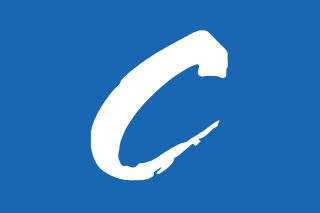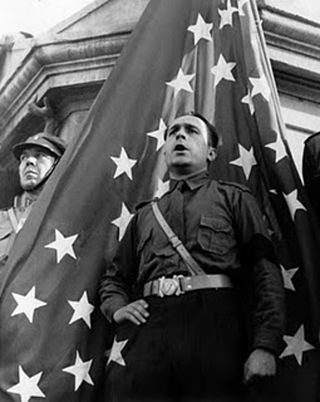
The Christian Democratic Party is a Christian democratic political party in Chile. There have been three Christian Democrat presidents in the past, Eduardo Frei Ruiz-Tagle, Patricio Aylwin, and Eduardo Frei Montalva.

The Socialist Party of Chile is a centre-left political party founded in 1933. Its historic leader was President of Chile Salvador Allende, who was deposed in a coup d'état by General Augusto Pinochet in 1973. The military junta immediately banned socialist, Marxist and other leftist political parties. Members of the Socialist party and other leftists were subject to violent suppression, including torture and murder, under the Pinochet dictatorship, and many went into exile. Twenty-seven years after the 1973 coup, Ricardo Lagos Escobar won the Presidency as the Socialist Party candidate in the 1999–2000 Chilean presidential election. Socialist Michelle Bachelet won the 2005–06 Chilean presidential election. She was the first female president of Chile and was succeeded by Sebastián Piñera in 2010. In the 2013 Chilean general election, she was again elected president, leaving office in 2018.

The Colombian Conservative Party is a conservative political party in Colombia. The party was formally established in 1849 by Mariano Ospina Rodríguez and José Eusebio Caro.
Presidential elections were held in Chile on 4 September 1946. The result was a victory for Gabriel González Videla of the Radical Party, who received 40% of the popular vote and 75% of the Congressional vote.

The Vanguardia Popular Socialista was a nationalist Chilean political party created in 1938. It was the direct heir of the National Socialist Movement of Chile (MNS) and founded as a consequence of the failed fascist coup in 1938 and its repression. It included Jorge González von Marées, while former MNS member Carlos Keller refused to join it. Initially allied with the Chilean left, The party moved back to positions similar to the far-right MNS in 1940. The VPS obtained 2.5% at the 1941 legislative elections, having two deputies elected, one of them being Jorge González von Marées.

The Conservative Party of Chile was one of the principal Chilean political parties since its foundation in 1836 until 1948, when it broke apart. In 1953 it reformed as the United Conservative Party and in 1966 joined with the Liberal Party to form the National Party. The Conservative Party was a right-wing party, originally created to be the clericalist, pro-Catholic Church group.

The National Party or Montt-Varist was a Chilean political party formed in 1857 as a split from the Conservatives by the supporters of President Manuel Montt and Interior Minister Antonio Varas. The National Party had a liberal-conservative ideology and was primarily supported by middle-high businessmen, bankers and journalists. The Welsh-born Edwards family was a bigger financer of the party, along with the aristocratic Balmaceda, who was linked to the Liberal Party. The party never was more than an influential third party, and since the late 1910s its influences declined considerably, stopping from participating to national elections after 1924, finally merging into the United Liberal Party in 1933. The monttvarista National Party is not to be confused with the National Party formed in 1966.

The United Conservative Party was a right-wing Chilean political party founded in December 1953 after the merger of the Traditionalist Conservative Party and a faction of the Social Christian Conservative Party, issued from the Conservative Party. It supported for the 1958 presidential election the candidacy of Jorge Alessandri and participated, along with the Liberal Party and supporters of former president Carlos Ibáñez del Campo, in its government. In 1962, it participated in the Democratic Front of Chile center-right coalition which opposed the left-wings FRAP coalition and supported for the 1964 presidential election Eduardo Frei Montalva.

The Agrarian Labor Party was a Chilean political party supporting the candidacy of Carlos Ibáñez del Campo for the 1952 presidential election. Formed in 1945, it was dissolved in 1958.

Eduardo Cruz-Coke Lassabe was a Chilean political figure, the conservative candidate in Chile's 1946 presidential election and the principal creator of the Chilean health system.

The Revolution of 1851 was an attempt by Chilean liberals to overthrow the conservative government of president Manuel Montt and repeal the Chilean Constitution of 1833. After various battles and sieges, by late December 1851 government forces had subdued the revolutionaries.
The Popular Socialist Party was a Chilean left-wing political party that existed between 1948 and 1957. It was the result of the division of the Socialist Party of Chile in 1948 by voting and promulgation of Law No. 8,987 of Defense of Democracy in which the PS was divided in its vote and support among pro-communist and anti-communist.

Political Evolution, also known in Spanish by its shorthand Evópoli, is a Chilean centre-right political party, founded in 2012. The party defines itself as a liberal platform for the people who look for a "modern centre-right who proposes as the central axis of their proposal the appreciation of diversity, the emphasis on encouraging local communities and the pursuit of social justice".

The Traditionalist Conservative Party was a right-wing political party in Chile founded in 1948 when the Conservative Party split into two factions. It participated in the coalition called National Concentration in the government of President Gabriel González Videla.
The National Falange was a Chilean Christian political party that existed between 1935 and 1957. It was the basis of the Christian Democratic Party (PDC); still it is customary to use the expressions "Falange" and "Falangista" to refer to members and activities of the Christian Democrats and the same party, respectively.
The Workers' Socialist Party was a leftist political party in Chile that existed between 1940 and 1944.
The Christian Conservative Party was a far-right conservative political party in Chile. It was officially recognized by the Electoral Service of Chile (Servel) on 30 October 2020.

Chilean nationalism is the nationalism of Chilean people and Chilean culture. It began as a strain of political thought that originated between 1904 and 1914 with the rise of the centenary essayists, the birth of the Nationalist Party and the reactivation of the authoritarian political discourse of the statesman Diego Portales.
This page is based on this
Wikipedia article Text is available under the
CC BY-SA 4.0 license; additional terms may apply.
Images, videos and audio are available under their respective licenses.











